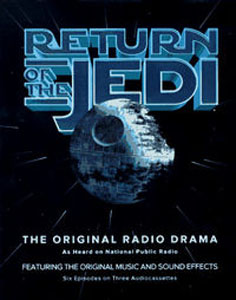While it was satisfying from a purely aesthetic viewpoint to have the “Return of the Jedi” radio drama (1996) complete the audio trilogy after a 13-year wait since “The Empire Strikes Back,” I also have to say this project completely missed the point of what made the “Star Wars” radio drama cool: additional material.
“Star Wars” (1981) was 6½ hours long, allowing for two completely original half-hour episodes and many new scenes and longer versions of established scenes. Due to a smaller National Public Radio budget, “Empire” (1983) was only five hours long, but at least there were a few new scenes. And it served the purpose of giving fans another outlet to experience the movie in a time when home video was in its infancy. At three hours long (apparently reflecting all the money HighBridge Audio – taking over for NPR as producers – wanted to spend), “Jedi” is little more than an adaptation from one medium to another, with that extra hour accounting for the fact that it takes longer for a scene to play out when the visuals have to be described through dialogue.
In fact, some movie scenes and dialogue are actually excised. We don’t hear Vader talking to Piett on the Executor bridge, as writers Brian Daley (who died on the same day production wrapped, in February 1996) and John Whitman instead give us a bit more of Han, Luke and Leia chatting on the Shuttle Tydirium. And Admiral Ackbar doesn’t say “It’s a trap!” (which is just as well, because the voice performance is way off).
The production values are actually a notch above “Star Wars” and “Empire,” as producer Tom Voegeli has become an old master of mixing John Williams’ music, Ben Burtt’s sound effects (including Ewoks) and the voice actors’ performances. Anthony Daniels is the only returning film actor, but Ann Sachs is now effortless as Leia, I’m accustomed to Perry King as Han, and Brock Peters’ Darth Vader inches closer to James Earl Jones. Joshua Fardon sounds more like “A New Hope” Luke, but he’s not off point, Paul Hecht’s Emperor is in the ballpark and Ed Asner takes a fair shot at Jabba the Hutt. Arye Gross’ Lando doesn’t quite work, John Lithgow is further off from Yoda than he was in “Empire,” and the radio dramas still haven’t figured out how to get Wedge or Boba Fett right.
But oh, how I would have loved to hear this cast perform substantial additional material. A lot of hype is given to Mara Jade’s appearance in the “Jedi” radio drama, but – in the guise of Arica — she and Threepio simply describe Oola’s death scene for the reader. Interestingly, Daniels is the one who brought Mara into the “Jedi” radio drama. Daley originally wrote the dialogue for Boba Fett, but the C-3PO actor correctly noted that it didn’t feel like Boba would make small talk with a droid.
The Arica scene provides a link to “Tales from Jabba’s Palace” (January 1996), and “Shadows of the Empire” (May 1996) is referenced through two bits of dialogue: Mon Mothma mentions the Battle of the Bajic Shipyards, and Han and Lando talk about “Shadows” events on the Falcon as they depart Tatooine.

The latter exchange is odd. Han says, “The way I heard it, you almost wrecked the Falcon. … Gimme a break, Lando, letting Threepio fly the Falcon?” Where would Han had have “heard it?” Almost certainly from Chewbacca in the cell in Jabba’s dungeon, but I think he should’ve mentioned that for clarity.
The Tatooine departure sequence is by far the meatiest new material in “Jedi,” even though it does not include any reference to the famous deleted sandstorm footage (which, admittedly, would not have played well in audio). This sequence finds Leia and Han reflecting on their last words on Cloud City; Artoo distracting an awaiting Imperial battle group by making Jabba’s minions think the Imps are after them, thus leading to a skirmish; Leia apologizing to Threepio for keeping him in the dark on the rescue plan; and Han talking up the idea of “Corellian Overdrive” (“doing whatever you need to do”). While it seems “Corellian Overdrive” must have come from Daley’s “Han Solo Adventures” novels, it does not: It is only brought up in this radio drama.
It’s interesting to imagine what Daley and Whitman would have done if “Jedi” had, say, four more episodes – putting it even with “Empire.” Just as Daley wrote “Rebel Mission to Ord Mantell” based on one line from “Empire,” I bet he would’ve pounced on Lando’s “little maneuver at the Battle of Taanab” and Mon Mothma’s assertion that “many Bothans died to bring us (the Death Star II plans).” Granted, it might have led to continuity problems, just as the short “construction of Luke’s lightsaber” scene that opens the “Jedi” radio drama is the third different version of that event, with the others coming in the “Jedi” novelization (and the deleted scene it’s based on) and “Shadows of the Empire.” The Battle of Taanab was explored in a roleplaying game, and since it takes place shortly after “A New Hope,” it wouldn’t fit smoothly with “Jedi.”
It might’ve been neat to hear “Shadows’ ” Bothan sequence dramatized, along with Luke’s lightsaber construction and maybe a bit of his solo Jedi training, and maybe the full Luke-and-Ben chat from the “Jedi” novelization, complete with Ben’s lie that Owen was his brother. In fact, James Kahn’s novel has several bits of bonus material that could’ve beefed up this project, including the Death Star preparing to fire on the forest moon and the Emperor mimicking Yoda’s speech pattern to goad Luke. A scene of Luke and company plotting out the logistics of rescuing Han might’ve been neat – they could’ve explored how they would handle various scenarios that ended up not happening.
I think I’ll listen to the “Shadows of the Empire” audiobook to get a flavor of what the “Return of the Jedi” radio drama could have been. As it stands, though, this installment has little reason for existing outside of dutifully completing the trilogy.

